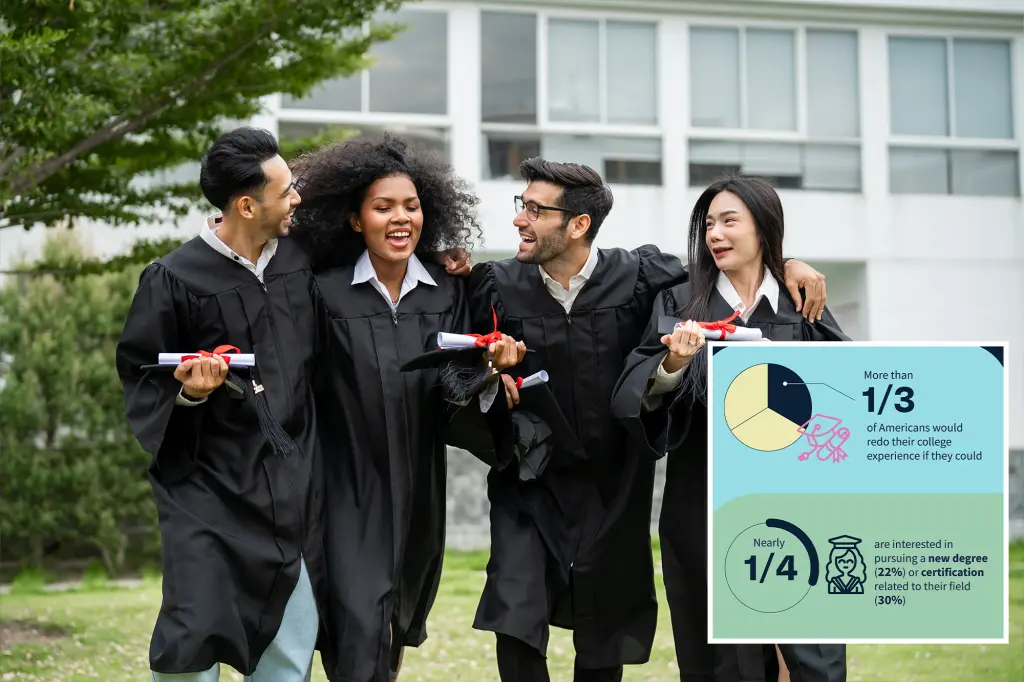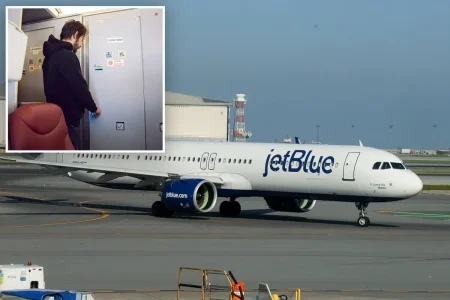The Evolving Landscape of Higher Education: Americans Reconsider Their College Experience
In a revealing survey conducted by Talker Research for CSU Global, more than a third of Americans (38%) expressed a desire to redo their college experience if given the chance. This sentiment was even stronger among college graduates, with 43% wishing they could go back and make different choices. The primary motivations behind this desire include exploring different career paths and increasing earning potential. As the professional landscape continues to evolve, many Americans are considering new educational opportunities to stay relevant in today’s rapidly changing job market. Nearly a quarter of respondents expressed interest in pursuing a new degree (22%), while a larger portion (30%) are looking into certifications related to their current field. Interestingly, while one in four admit they weren’t particularly interested in attending college at the traditional age, 34% are now considering higher education as a viable option for their future.
Life changes appear to be a significant catalyst for educational reconsideration. The survey revealed that the average respondent has experienced three major life changes in the past five years, with some experiencing even more frequent shifts—at least one significant change annually. These transformative events include illness or loss in the family (41%), career or job changes (37%), and relocating within their state (24%). For those who have changed jobs or careers recently, the average person has done so twice, with one in six admitting they felt unprepared for these transitions. This sense of unpreparedness may be contributing to the growing interest in additional education, as people seek to better equip themselves for future changes and opportunities in an increasingly dynamic professional environment.
The current job market heavily influences Americans’ perspectives on education, with a third of employed respondents indicating that market conditions significantly impact their desire to redo their college experience. There’s a strong belief (63%) in the value of “practical” degrees—those that provide useful, applicable skills—regardless of whether such credentials are required for their current positions. Among those who pursued higher education, about half (51%) initially obtained practical degrees in fields like education, business, communications, or healthcare (10% each). While most college-educated employed respondents (68%) believe their degrees remain relevant to their current work, nearly one-fifth (18%) feel their education no longer applies to their professional lives, highlighting a potential gap between educational preparation and workplace requirements in a rapidly evolving economy.
Looking toward the future, respondents identified several fields they consider most valuable in today’s job market, with artificial intelligence and machine learning leading the pack (20%), followed by healthcare (13%), cybersecurity (13%), accounting (13%), and business or economics (9%). Dr. Becky Takeda-Tinker, president of Colorado State University Global, notes that technology has dramatically transformed the job market in recent years, causing a parallel evolution in the skills professionals need to succeed. The rise of artificial intelligence has created both opportunity and concern—39% of employed respondents worry about their field being changed or phased out by AI. However, this concern is balanced by a proactive attitude, with 45% believing they would benefit professionally by improving their AI-related skills and knowledge. This indicates a recognition among workers that adaptability and continuous learning are essential in the modern workplace.
Despite the clear desire for educational advancement, traditional college programs present significant barriers for many Americans. Nearly half of respondents (45%) believe the college experience today differs from what it was just five years ago, with an even larger percentage (57%) seeing changes compared to a decade ago. The primary obstacles preventing people from pursuing degrees include financial concerns (30%), shifting priorities (22%), and time constraints (21%). If given the opportunity to attend college today, respondents would primarily focus on exploring different career paths and increasing their earning potential (16% each), followed by learning something new (15%), gaining more upskilling or reskilling opportunities (11%), or fully experiencing college life (10%). Notably, more than half of those surveyed (54%) would prefer hybrid or fully online classes rather than traditional in-person learning, reflecting a significant shift in educational preferences.
“Higher education looks very different today,” observes Dr. Takeda-Tinker, highlighting the transformation away from the traditional model of fixed-time, in-person classes. Modern learners seek educational options that allow them to remain industry-relevant while balancing work and other responsibilities. The availability of high-quality, fully online, asynchronous programs has created new possibilities for working professionals to expand their skills and improve their marketability without putting careers on hold or sacrificing personal commitments. This evolution in higher education delivery models addresses the practical challenges many potential students face, potentially making continuing education more accessible to those who previously found traditional college attendance impossible due to work, family, or other obligations. As industries continue to evolve and the demand for new skills grows, these flexible educational approaches may become increasingly important for workers looking to maintain their competitive edge in a changing job market.














